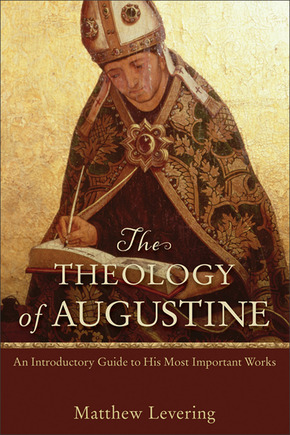
Matthew Levering
Reviewed by: Carl R. Trueman
The Theology of Augustine, by Matthew Levering. Published by Baker Academic, 2013. Paperback, 224 pages, list price $24.99. Reviewed by OP minister and professor Carl R. Trueman.
There is no postbiblical writer of more theological importance than Augustine. Yet he is a vast and subtle thinker and, while the Confessions is broadly accessible, his body of writings as a whole is not. That is why it is such a pleasure to be able to commend the latest book from the distinguished theologian Matthew Levering. The Theology of Augustine: An Introductory Guide to His Most Important Works is, as the subtitle indicates, an overview of the most important writings of the bishop of Hippo: On Christian Doctrine, Answer to Faustus, a Manichean, Homilies on the First Epistle of John, On the Predestination of the Saints, Confessions, City of God, and On the Trinity. Some of these works will be familiar to many, at least as titles; others are perhaps less well-known. Yet all make significant contributions to Augustine's thought.
In each chapter, Levering offers a detailed summary of the arguments put forward by Augustine. As far as possible, he avoids offering overt interpretation of the texts. What emerges so clearly from the book as a whole is the centrality of love to human life, both as individuals relate to each other and the world around them and as they relate to God. It is thus appropriate that the final text with which he deals is On the Trinity, which draws out in a remarkable synthesis the connection between human love, divine love, and the doctrine of the Trinity.
Augustine's doctrine of the Trinity has been subjected to searching criticism, perhaps most influentially in recent decades by the late Colin Gunton. Gunton saw in Augustine an incipient modalism and the intellectual origins of many of the problems later manifested in Enlightenment thought. While not offering a direct rebuttal to Gunton, Levering's summary of Augustine's On the Trinity is helpful; it is an excellent introduction to the text and avoids making anachronistic theological judgments.
This is a book that should be read by thoughtful pastors. There is no theologian who explores the psychology of love in a more searching way than Augustine. This is pastorally very helpful. For example, why do people have a compulsion to look at pornography? Augustine offers a multilayered answer, from the power of the visual in gripping the mind and fueling salacious appetites to the fact that fallen human love is about objectifying the other and finding its debased fulfillment ultimately in sexual pleasure. He would also add that the only cure for such is to learn to love God and thus to hate that which opposes God.
This is an excellent introduction to Augustine's thought, which will also prove useful as an ongoing resource when grappling with the texts themselves.
(For Trueman's fuller review of this book, click here.)
August 31, 2025
J. N. Darby and the Roots of Dispensationalism
August 24, 2025
August 17, 2025
Reformed Covenant Theology: A Systematic Introduction
August 10, 2025
August 03, 2025
July 27, 2025
July 20, 2025
© 2025 The Orthodox Presbyterian Church